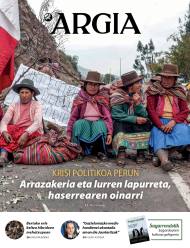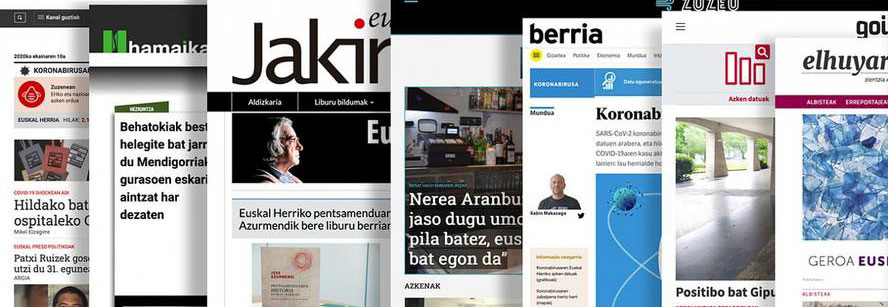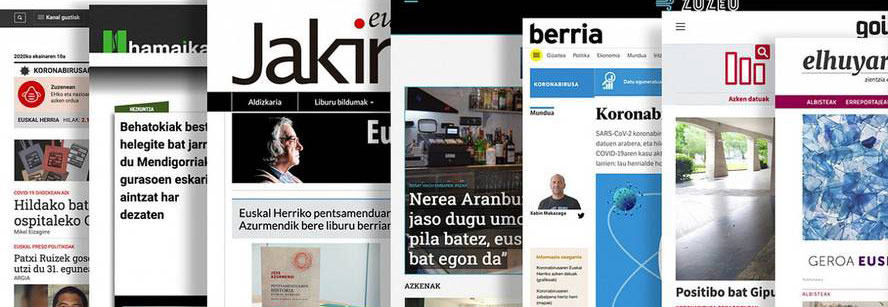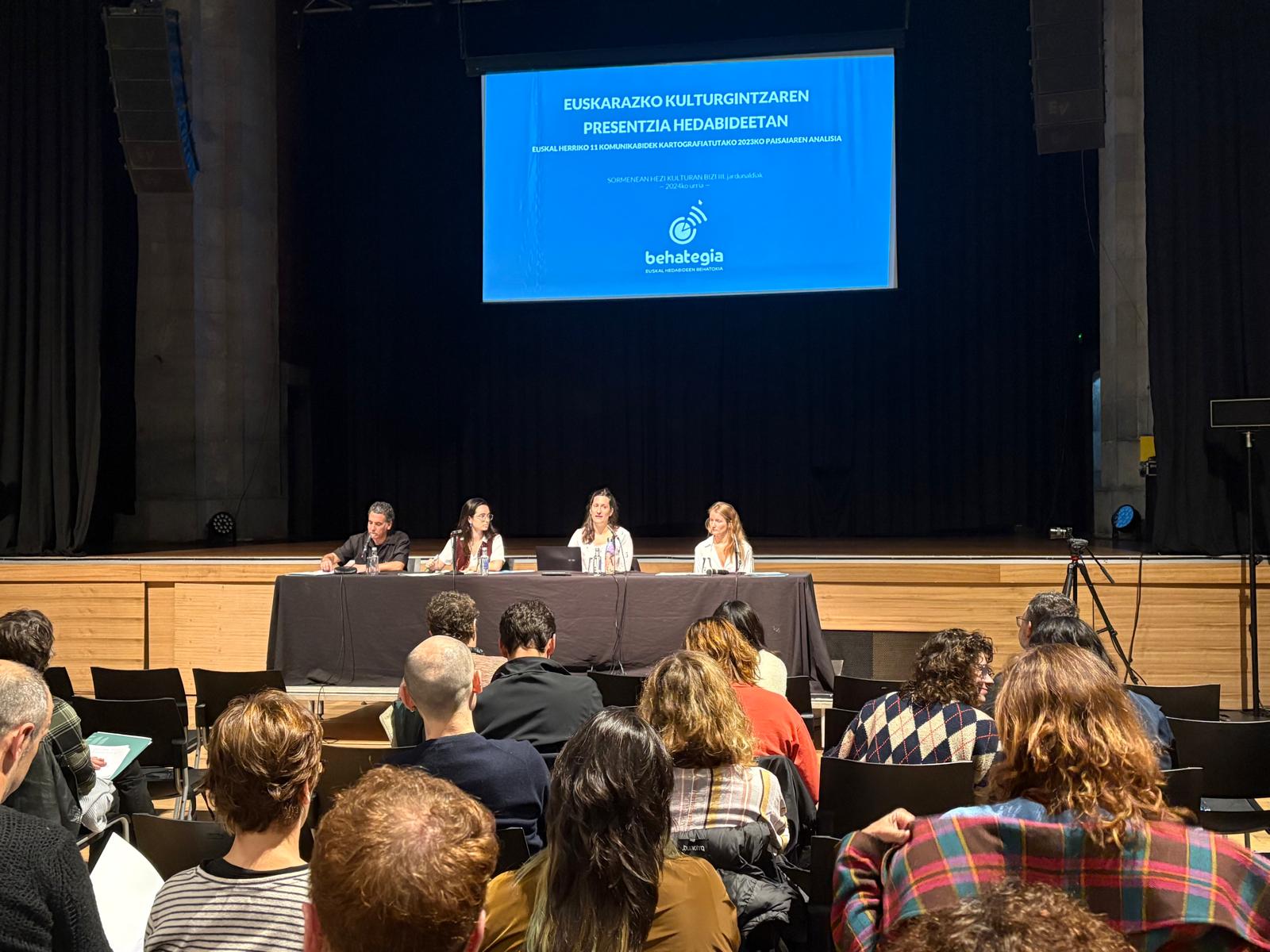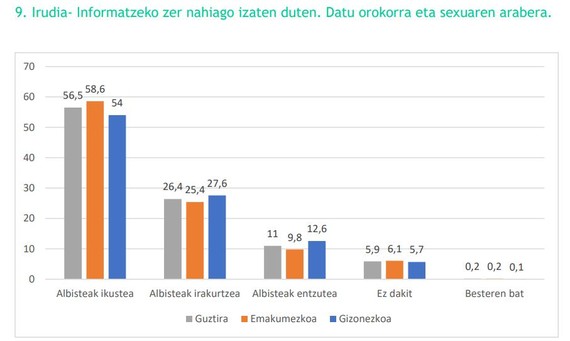"Media in Euskera are not in government priorities"
- The Basque Media Association, Hekimen, has been negotiating with the Basque Government the subsidies that legally correspond to them for promoting Basque to the media in Basque. But while the subsidy obtained for the media in Basque is not sufficient to stabilise the sector, the government has distributed EUR 6 million to support mainly the Spanish media, once again showing which media reinforce and reject our institutions with public money. We talked to Igor Astibia, coordinator of Hekimen.

The government has shared EUR 6 million among the media by the end of 2022, arguing that it is to deal with the economic damage caused by COVID-19. A year earlier it allocated EUR 5 million and, as then, the Vocento group and the Noticias group remain the most subsidised. As at that time, the Government has left out of these economic headings various media in Basque, including ARGIA. The world of communication is undergoing profound changes and this
general trend has been compounded by the pandemic, the increase in life (including electricity and paper)… and this type of aid is necessary to help transformation, what happens is how that money is distributed. In 2021, the government distributed the money without making any calls, through direct grants, and in 2022 they did so with some criteria, but with these criteria they have again prioritized the same groups of lines, the largest, just the opposite: public money should prioritize the most vulnerable and the most needy, the media without profit. These subsidies that strengthen the strongest should give us what to think. If we look at the distribution of money from a linguistic point of view, it is even more serious: the media that
are betting on linguistic normalisation in this Basque country have been left out again: almost all in 2021 and most in 2022. They have rewarded the largest groups and have harmed the media in Basque. The Government has set criteria for the distribution of these
6 million, but the choice of these criteria is not easy to understand. Day to day is one of the criteria they have set, but what is the day to day, when today you are all in the digital realm? [the government has left out of this distribution of money to ARGIA arguing that it is a weekly] What universe of means do we want? If priorities are to be set in the distribution of money, we believe that the criterion should be the weight of language and the approach of the people, but they have set a criterion that harms the media in Basque: the scope.
"Once again the big groups have given advantage from the government. I don't know if there's a trap, but it's a disadvantage, and institutions shouldn't promote disadvantage."
What imbalance does the strengthening of these funds have with public money, both through special subsidies and through institutional advertising (i.e. in which media institutions advertise paid)? We come from an unbalanced picture, and instead of reducing the imbalance, these subsidies only
increase the imbalance. The imbalance in institutional advertising is enormous and the latter subsidy has followed the same approach as it does: the scope [how many citizens this means of communication reaches]. But the scope depends on: The media in Euskera have a very large reach if we take into account the potential receivers in Euskera, but we take into account the reach of the entire population and we are again harmed.
To reward the media, both in Spanish and in Euskera, which have greater reach in the same field of play is a “trap”, knowing that potential Castilian speaking receptors are more than Euskaldunes receptors? That's it. Everyone has put us in the same bag and since we
are in a non-standard language we cannot compete in it.
To what extent does the unequal distribution of public money harm the plurality of the press supply and the right to information for citizens? From the sector we work in Euskera we emphasize
our linguistic contribution, but not only that, but also from the perspective of diversity and the right to information, because our social function goes beyond linguistic normalization. In order to justify the EUR 6 million item, the media have highlighted precisely that social function that we have from the public administration, but once again the largest groups are prioritised and if the largest money market goes to them, they are given the advantage of facing the profound transformation process that we all live in the sector. This advantage may allow these large media groups to offer in the future attractive and innovative tools and products and we do not. I do not know if there is a trap, but it is a disadvantage, and the institutions should not promote disadvantage, on the contrary. Organisations should encourage maximum guarantees of diversity and vision through support. It should promote a plural communication system to strengthen public functions, social function and critical function, not a single vision.
There is also the media subsidy in Basque, which must be granted by law. You have been negotiating for three years and you have heard from the government that it was not possible to increase the amount you have asked to stabilise the sector. Suddenly, it
has taken out a EUR 6 million item to be distributed to the media that operate mostly in Spanish. Consensus was reached in 2019 on a new subsidy model that does not depend precisely on its scope, but focuses more on the news and content generated, with the aim of ensuring media stability and overcoming media competition. It was an important step, but in these three years we have not managed to update the standard costs set then – we are talking about the costs for 2018-2019, and it is clear that the costs have increased greatly – nor have we managed to significantly increase this grant bag in order to cover the actual costs. The Basque Government has told us that there are no resources to meet the demands we have put on the table, and they have suddenly raised a subsidy from the first EUR 5 million and the following year EUR 6 million. Yes, we have taken it with surprise, and in the end it is a matter of priorities, because it is always public policies, and it seems that the Basque media are not among the government’s priorities, at least that is what we have seen in the distribution of money. From the initiative in which we are represented the
media in Basque, we will continue to influence the forums needed to place the media sector in Basque among the priorities.
He says it is a matter of priorities. Is there no political will to put the Basque media at the forefront? The
Media Bureau set up a forum for stable dialogue with the government and we value it positively, we see that the department that maintains this intelligence with us is willing to push our sector forward, but then, in the light of this, it seems that the economic distribution is decided elsewhere. Finance puts a stop to every government department, and we have been told that there is no significant increase in resources for our sector in the budgets. We will continue to encourage this stock market to be increased in the annual budgets with the dual aim of ensuring the stability of the sector and of boosting the innovation processes needed for the sector.
"We should agree on a system of subsidies that outweighs competition between the media in Basque, because we cannot be looking at each other, how much each one has received: it is perverse"
It concerns the stabilisation of the sector, but in Basque media subsidies, when the costs have increased, there are media that have received less money than in other subsidies. Yes, the current model of media subsidies in Basque still has shortcomings. If one is very significant and we have repeated it over these years: the presentation to the call for
a significant increase in production or a new media means must provide more resources to allocate them, otherwise the result is that the stock exchange is limited and affects other media, that is, the money is taken from others, and that is what has happened in the latest media subsidies in Basque. The situation is paradoxical: it is actually good news to create a new media in Basque and we should not live with concern, but a new project causes the money to be reduced to others, and to this we must add that the increase in life, the standard costs, has completely exceeded the money bag we agreed on in 2019.
In short, media subsidies in Basque put us in competition with each other. Do you prefer a different formula that meets your needs? In other words, we should agree on a new system that overcomes competition, because we cannot
be one looking at another, because everyone has received the money: it is perverse. What the media need is that they will have the means to do the work they do, so that uncertainty is not imposed on each call, and there are formulas for this either by convention or by other means. When there is political will we have seen that there are all kinds of formulas: in 2021, EUR 5 million were distributed without making a call, in 2022 it was convened but with a few and certain conditions…
It talks about the importance of innovation in formats, media, journalistic models… Are the institutions collaborating on this path, do they believe in this wager? It is not easy to achieve, as is done with other sectors,
a sum of money for our innovation sector. We have done two rounds with the parties in the Basque Parliament and at first everything was fine words, but then money has hardly been allocated. The Basque Government told us that if money was needed to innovate, on top of the table to put projects, and we have done so, we have submitted projects, but they have only accepted about 3% of the resources that these projects need. The key lies in the relay that the government gives to the Basque media, and we will continue to try to be taken into account in the spaces of power. On this road we are moving slowly.
What are
the main challenges of short- and medium-term initiatives? Acquire more resources, take steps in knowledge and improvement of the sector and deepen collaboration. In short, the sector is in a process of transformation and our role is to support these processes from Hekimen, offering training to the media, promoting joint work, acquiring resources…
.jpg)
Over the past few weeks I have had these two books in my hands: The space of reflection in Basque (Euskaltzaindia, 2024) and Mariano Ferrer, reflexive journalism. Journalism and commitment (Erein, 2023) . I have read that 42.2% of Basques see ETB1 and 20.6% read the Basque... [+]
Over the past few weeks I have had these two books in my hands: The space of reflection in Basque (Euskaltzaindia, 2024) and Mariano Ferrer, reflexive journalism. Journalism and commitment (Erein, 2023) . I have read that 42.2% of Basques see ETB1 and 20.6% read the Basque... [+]









